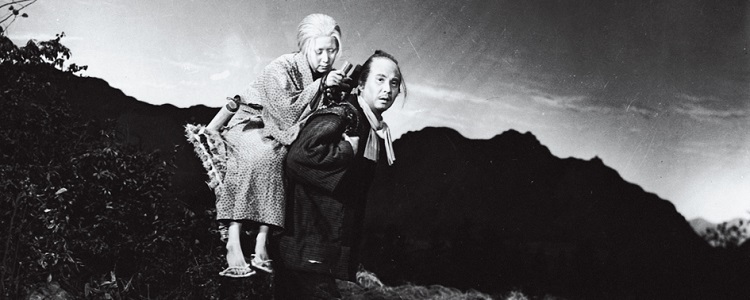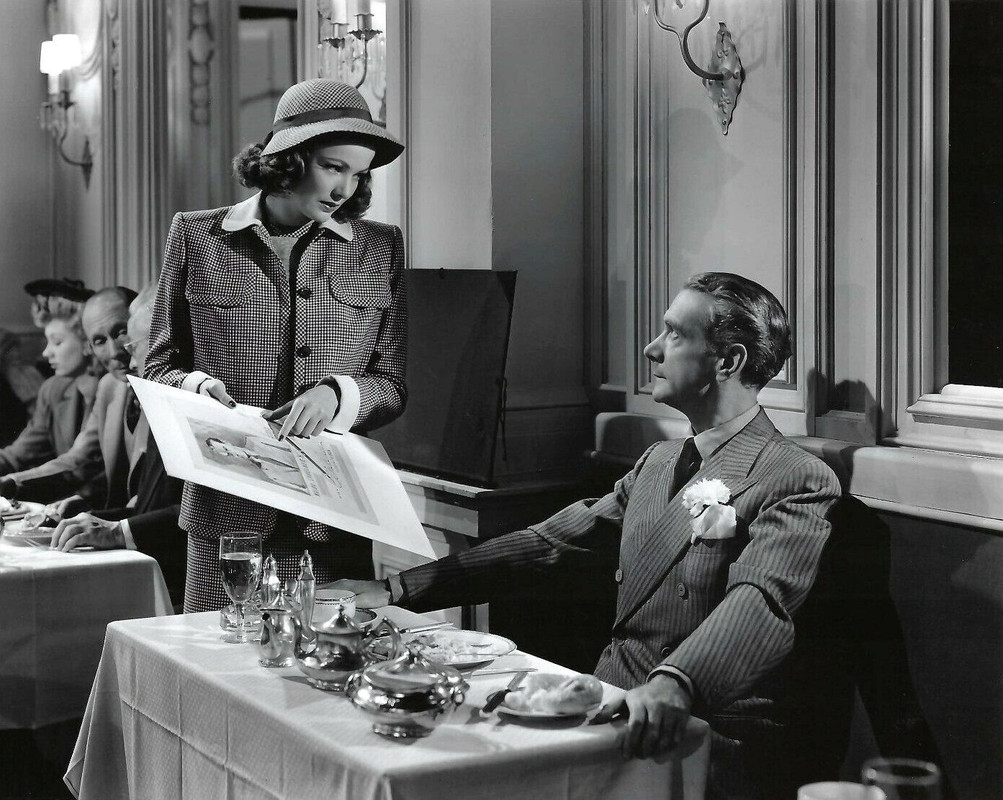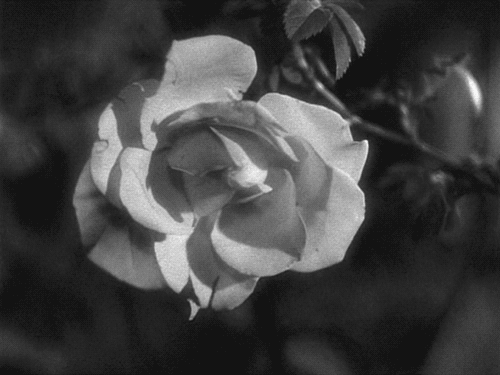“Have you seen Mr Tavernier tonight?”Ascenseur pour l'échafaud [Elevator to the Gallows] (Louis Malle, 1958)
Dec
13
croissants

Mr Tavernier (Maurice Ronet) taking a bite out of a croissant while dialling a number in a lively French café. A blonde behind him shows an interest. DP: Henri Decaë.
BookAdaptation
“This winter… I'm going to the mountain. My mother went to the mountain, as did the mother-in-law of our home. So I have to go too.”楢山節考 [Narayama-bushi kō / The Ballad of Narayama] (Keisuke Kinoshita, 1958)
Dec
11
International Mountain Day

Tatsuhei (Teiji Takahashi) with his mother Orin (Kinuyo Tanaka) in a bamboo carrier on his back. She's combing his hair. Around them the mountain range. DP: Hiroshi Kusuda.
Travel mountains on International Mountain Day
A starving community has come to the agreement that the elders approaching the age of seventy are to be carried up Narayama mountain to die. The day prior to the mountain's festival, sixty-nine year old Orin prepares to leave, carried by her son Tatsuhei.
– Orin
In Keisuke Kinoshita's highly stylised 楢山節考, the arguably cruel (and most likely fictional) practice – of 姥捨て [ubasute, abandoning an old woman] – is superbly abstracted. Narration, dramatic lighting, colour filters and very obviously a soundstage underline that what we're watching is not a film, but a kabuki play.
“I don't use a pen. I write with a goose quill dipped in venom.”Laura (Otto Preminger + Rouben Mamoulian, 1944)
Dec
11

Laura Hunt (Gene Tierney) interrupts arsine newspaper columnist Waldo Lydecker (a delicious Clifton Webb) with her designs during his lunch. DPs: Joseph LaShelle & Lucien Ballard.
– Waldo Lydecker
Holubice [The White Dove] (František Vláčil, 1960)
Dec
9
Official Lost And Found Day

Michal (Karel Smyczek) finds the white dove perched on a sculpture. The artwork depicts a faceless boy. DP: Jan Čuřík.
Something is lost and found on Official Lost and Found Day (USA)
“We come to life, we die… It's a perpetual renewal. How boring.”剣 (小説) [Ken / The Sword] (Kenji Misumi, 1964)
Dec
6
rice

Young people eating. An older woman in kimono scoops rice from an electric rice cooker. When read from right to left, this scene – as are numerous others in Chikashi Makiura's photographed 剣 (小説) – are split into tradition and modernity. DP: Chikashi Makiura.
– Mibu
“Men! The beasts! God would show wisdom if he took the hands from all of them!” The Unknown (Tod Browning, 1927)
Dec
3
Let's Hug Day

Target girl Nanon (Joan Crawford) hugs her circus partner, Alonzo (Lon Chaney) the knife thrower. Her tight embrace may reveal his secret. DP: Merritt B. Gerstad.
Someone's hugged on Lets Hug Day (USA)
Nanon Zanzi (Joan Crawford) is mortally afraid of men. Of their grabbing, grasping, groping hands. This is why she only trusts her knife throwing partner Alonzo the Armless (Lon Chaney). What she doesn't know is that Alonzo and his 4'10”/1,47 m accomplice Cojo (that great staple of precode horror Tufei Filhela aka John George), use the #circus to hide from the long arm of the law, who is looking for a murderer with a deformed thumb. Who would suspect an armless man?
– Nanon Zanzi
As mighty as Alonzo may be, the incomparable Lon Chaney owes much to armless violinist and knife thrower “Judge” Paul Desmuke. Story goes that Desmuke taught Chaney his knife act in two months. More probable is that some of the more impressive close-up scenes show the Judge's, not Chaney's, feet.
Like Alonzo, The Unknown has lost some flesh. Until 1968, only mangled bootlegs were available; a complete print was considered non-existent. Five years later, news broke about film reels of unknown origin labelled inconnu – [the] unknown, somewhere in the bowels of the Cinémathèque Française.
Some 14 minutes, outlining the Armless' background, are still missing. Do check your attic.
Si muero antes de despertar [If I Should Die Before I Wake] (Carlos Hugo Christensen, 1952)
Nov
28
soup

Lucio (Néstor Zavarce) having dinner with his mother (Blanca del Prado) and strict father. DP: Pablo Tabernero.
– Can such miracles really happen?
– You and I are living proof.La Belle et la Bête [Beauty and the Beast] (Jean Cocteau + René Clément, 1946)
Nov
28
Giving Tuesday

The most beautiful flower, a rose, in La Bête's enchanted garden. DP: Henri Alekan.
Someone is given something special for Giving Tuesday (USA)
Just before leaving home for a business trip, a father asks his three daughters what he can bring them as a return gift. The eldest two ask for silly, extravagant things. A monkey! A parrot! The youngest simply wishes the most beautiful flower which the father finds in an enchanted garden, guarded by a terrible beast. And will pay for with his life unless he gives his youngest away to the beast, to die in his place.
#Cocteau and Clément's La Belle et la Bête is of course based on Gabrielle-Suzanne Barbot de Villeneuve's fairy-tale, which on its turn was based on the classic myth of Cupid and Psyche.
“This we do for pleasure, so that we may shortly be at the mercy of venomous snakes and poisonous ants. How foolish can human creatures be.”Picnic at Hanging Rock (Peter Weir, 1975)
Nov
26
Valentine's cake – alfresco

A piece of cake. With teeny tiny ants crawling all over it. Awww! DP: Russell Boyd.
– Miss McCraw
“The vicinity is reknowned for its venomous snakes and poisonous ants of various species. It is, however, a geological marvel.”Picnic at Hanging Rock (Peter Weir, 1975)
Nov
26
World Lewis Day

A koala high up in a tree, observing one of the rescue operations. DP: Russell Boyd.
A koala for World Lewis Day
It's not possible to be in nature, one can only be absorbed by it.
– Mrs. Appleyard